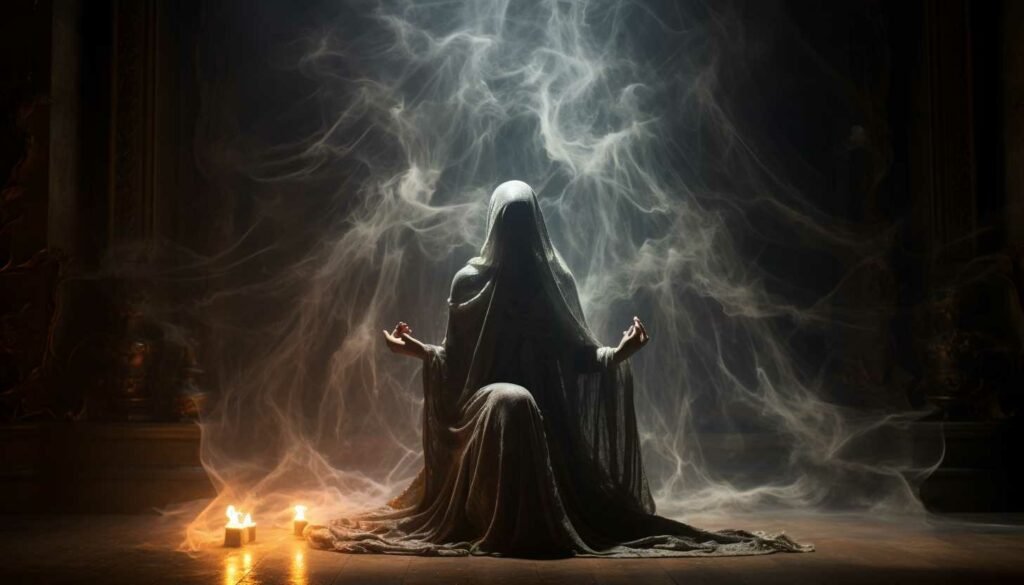Cultural and Personal Contexts
Dreams where deceased loved ones appear alive are deeply influenced by cultural and personal contexts. These dreams can vary significantly across different cultures, reflecting diverse beliefs about death and the afterlife. Personal experiences and the emotional relationship with the deceased also shape the dream’s nature and its impact on the dreamer.
Common Themes and Symbols
Dreams of seeing a dead person alive often revolve around common themes such as closure, unresolved emotions, or significant life lessons. Symbols such as conversations with the deceased or their presence in familiar settings can offer insights into the dreamer’s subconscious desires and fears.
Interpreting Your Own Dreams
To effectively interpret these dreams, it’s crucial to consider the specific symbols and themes that appear. Reflecting on personal experiences and emotions related to the dream can provide deeper understanding and potential paths for emotional healing. Engaging with a professional for a more structured analysis can also be beneficial.
Symbolic Meanings of Seeing a Dead Person Alive
Representation of Traits or Memories
Seeing a dead person alive in your dream might not necessarily represent the literal presence of the deceased individual. Instead, it could symbolize certain qualities, traits, or aspects of the person that still resonate with the dreamer. It may serve as a reminder of the influence, impact, or guidance the deceased person had in the dreamer’s life.
Connection to Unresolved Issues
Dreams about seeing a dead person alive can also involve symbolic representations or metaphors that hold personal meaning for the dreamer. For example, the deceased person may appear in a different form, such as a child or a younger version of themselves, symbolizing a specific aspect of their personality or relationship with the dreamer. These symbolic variations provide a unique lens through which the dreamer can interpret their emotions, memories, or unresolved issues associated with the deceased person.
Signs of Comfort or Closure
Seeing a dead person alive in a dream can hold significance. Such dreams may symbolize various emotional, psychological, and spiritual elements. They can suggest a desire for closure or the need to work through unresolved feelings about the deceased. For some, it’s a source of comfort and a way to temporarily revisit the presence of the person they miss. Interpretation can be highly individual, influenced by your relationship with the deceased, cultural beliefs, and the specific context of the dream. While
Emotional and Psychological Implications
Processing Grief and Loss
Dreams where deceased loved ones appear often signify the dreamer’s ongoing processing of grief and loss. These dreams can serve as a subconscious arena for facing the emotions that might be too difficult to handle while awake.
Longing for Reconnection
The appearance of a deceased person in dreams can also highlight a deep longing for reconnection. This longing can manifest as vivid, emotional dream encounters where the dreamer may experience conversations or scenarios that reflect their desires for closure or continued connection.
Impact on Mental Health
The recurring theme of seeing a dead person alive in dreams can have significant implications on one’s mental health. It can lead to a range of emotions from comfort to confusion, impacting daily emotional stability and overall mental well-being.
Spiritual Perspectives on Dreaming of the Deceased
Messages from Beyond
Dreams where deceased loved ones appear often carry profound spiritual significance. Many believe these dreams are a form of communication from the spirit world, where the deceased convey messages or guidance. This perspective is rooted in various cultural and spiritual traditions, suggesting a bridge between the living and the spiritual realms.
Spiritual Guidance and Reassurance
In these dreams, the presence of a deceased person can be interpreted as a form of spiritual guidance or reassurance. Dreamers may feel a comforting presence, offering solace and a sense of peace. It’s a personal experience that can help individuals navigate their spiritual journey, providing clarity and support during times of uncertainty.
Cultural Interpretations
Cultural beliefs play a significant role in how these dreams are interpreted. Different cultures view the appearance of deceased individuals in dreams through unique spiritual lenses, often reflecting broader societal beliefs about death and the afterlife. These interpretations can vary widely but generally emphasize the enduring connection between the living and the deceased.
Common Interpretations and Their Significance
Closure and Unfinished Business
Dreams involving deceased loved ones often symbolize closure or unresolved issues. These dreams might prompt you to address lingering feelings or unfinished interactions that were not possible before their passing.
Warnings and Premonitions
Such dreams can sometimes serve as warnings or premonitions. Paying attention to the context and emotions of the dream can provide insights into potential areas of concern in your waking life.
Celebration of Life and Legacy
Dreams of deceased individuals can also be a celebration of their life and legacy. Reflecting on the positive impacts they had during their lifetime can offer comfort and a sense of connection.
It is important to recognize that dream interpretations are subjective and can vary based on personal experiences.
Analyzing Dreams with Deceased Loved Ones
Decoding Messages
Dreams involving deceased loved ones often carry complex messages that reflect our deepest fears, desires, and unresolved issues. Decoding these messages can provide valuable insights into our emotional and psychological state, helping us to address underlying issues or celebrate cherished memories.
Understanding Emotional State
Dreams with deceased individuals can serve as a mirror to our current emotional state. They often reveal feelings of grief, longing, or even unresolved guilt that we may not be fully conscious of during our waking life. Recognizing these emotions can be a crucial step in our healing process.
Learning from the Experience
Every dream encounter with a deceased loved one offers a unique opportunity to learn and grow. Reflecting on these dreams can help us understand more about our needs for closure, reconciliation, or understanding. It’s important to approach this reflection with openness and honesty, possibly with the aid of a dream journal or professional guidance.
The Role of Dreams in Grieving Process
Dreams play a pivotal role in the grieving process, offering a unique space for emotional exploration and healing. Dreams can serve as a therapeutic tool, helping individuals navigate through the complex emotions associated with loss.
Healing and Coping Mechanism
Dreams about deceased loved ones often provide comfort and a subconscious way to cope with grief. These dreams can manifest as vivid memories or imagined interactions, allowing for continued emotional connection and processing of loss.
Revisiting Memories
Through dreams, individuals often revisit memories with the deceased, which can be both comforting and painful. This revisiting can help maintain a bond with the loved one and assist in the emotional processing needed for healing.
Navigating the Stages of Grief
Dreams reflect the various stages of grief identified by Dr. Elisabeth Kübler-Ross, including denial, anger, bargaining, depression, and acceptance. They can highlight where an individual is in their grieving process and help them move towards acceptance and healing.
Dreams about deceased loved ones are not just reflections of our grief but are also instrumental in our healing journey.
Symbolic Variations in Dream Appearances
Dreams involving deceased loved ones often feature symbolic variations that can provide deep insights into our subconscious. These variations can manifest in several ways, each carrying its own set of meanings and implications.
Age and Form Changes
In dreams, seeing a deceased person at a different age or form than when they passed away is common. This can symbolize different aspects of the person or the relationship shared with them. For instance, seeing them younger might represent nostalgia or unresolved feelings from that period.
Symbolic Objects or Settings
Dreams may also incorporate symbolic objects or settings that hold personal or cultural significance. These elements can enhance the message or emotion the dream is conveying. For example, a childhood home might appear to evoke feelings of safety or unresolved past issues.
Interactions and Conversations
The nature of interactions and conversations with the deceased in dreams can reveal a lot about your emotional state and the message of the dream. Peaceful interactions might indicate a need for closure, while unsettling ones could highlight unresolved conflicts.
Note: The way these symbolic variations appear and interact in your dreams can provide valuable clues to your inner thoughts and feelings.
Cultural Beliefs and Their Influence on Dream Interpretations
Global Perspectives
Dream interpretations vary significantly across different cultures, reflecting diverse beliefs about the spiritual world and the afterlife. For instance, in some Eastern cultures, seeing a deceased person alive in a dream might be considered a good omen or a message from ancestors, while Western interpretations might lean more towards psychological aspects of grief and memory.
Religious Contexts
Religious beliefs deeply influence dream interpretations. In Christianity, such dreams might be viewed as a form of spiritual communication or a visitation from heaven. Conversely, in Hinduism, they could signify unresolved karma or the soul’s journey after death. Understanding these contexts can provide deeper insights into the meanings of dreams.
Personal Beliefs and Dream Meaning
Personal beliefs play a crucial role in how dreams are interpreted. The significance of seeing a dead person alive in a dream can be comforting or disturbing, depending on one’s personal views about death and the afterlife. It is important to recognize that dream interpretations are subjective and can vary based on personal experiences.
Practical Tips for Interpreting Dreams of Deceased Persons
Keeping a Dream Journal
Maintaining a dream journal is a foundational step in understanding the nuances of your dreams about deceased loved ones. Record each dream as soon as you wake up, noting down as many details as possible. This practice helps in recognizing patterns and themes that may be significant.
Seeking Professional Insight
It’s beneficial to seek guidance from a professional dream interpreter or a psychologist who specializes in grief counseling. They can provide expert insights that are tailored to your personal experiences and emotional state.
Reflecting on Personal Connections
Reflect on the relationship you had with the deceased and the emotions the dream evoked. This introspection can reveal deeper meanings and help in processing unresolved feelings. Consider how the dream’s content might relate to your current life situations or feelings about the person.
The Psychological Comfort of Dream Visits
Dreams where deceased loved ones appear can provide significant emotional relief and a sense of presence that many find therapeutic. These encounters, often termed as visitation dreams, are not just figments of the imagination but can be profound experiences that offer comfort and a feeling of closeness to those who have passed away.
Emotional Relief
In visitation dreams, the appearance of a deceased loved one can evoke a deep sense of peace and solace. These dreams often occur during periods of intense grief or longing, providing a temporary respite from the pain of loss. The vividness and positive emotions experienced during such dreams can significantly aid in emotional healing.
Sense of Presence
The vivid representation of a deceased person in dreams can create a powerful sense of their presence. This can be especially comforting for those who yearn for just one more moment with their loved one. It’s as if, through the dream, the bereaved are granted a chance to reconnect, albeit briefly, with the deceased, which can be incredibly soothing.
Therapeutic Benefits
The therapeutic benefits of such dreams are well-documented. They can help individuals process their grief and move towards acceptance. For many, these dreams provide a unique form of closure, allowing them to address unresolved feelings and perhaps even receive messages of reassurance from their loved ones.
Exploring the Mystery of Dream Encounters
Research and Theories
Dream encounters with deceased loved ones are a profound area of study in both psychology and dream research. Theories often suggest that these dreams are a form of emotional processing or a manifestation of unresolved grief. Researchers continue to explore how these encounters affect dreamers’ mental and emotional states.
Personal Stories and Anecdotes
Many individuals report vivid experiences of speaking with deceased loved ones in dreams. These personal anecdotes provide unique insights into the emotional significance of such dreams. They often highlight a deep sense of connection and unresolved emotions that surface during sleep.
Expanding Understanding of Dream Psychology
The study of dream encounters with the deceased not only broadens our understanding of dream psychology but also intersects with cultural and spiritual perspectives. It invites us to consider how personal and collective unconscious play a role in shaping these dream narratives.
Conclusion
In summary, seeing a dead person alive in a dream can carry a multitude of meanings, deeply rooted in personal emotions, cultural beliefs, and psychological states. Whether it represents unresolved feelings, a longing for connection, or symbolic messages of guidance and change, these dreams invite introspection and understanding. They offer a unique opportunity to explore unresolved issues, embrace comforting memories, or heed warnings conveyed through the subconscious. Ultimately, the interpretation of such dreams is highly individual, reflecting one’s relationship with the deceased and their own spiritual or emotional journey.
Frequently Asked Questions
What does it mean to see a dead person alive in a dream?
Seeing a dead person alive in a dream can symbolize unresolved emotions, unfinished business, or a subconscious desire for closure. It may also represent qualities or traits of the deceased that resonate with the dreamer.
Can such dreams be a source of comfort?
Yes, for many, these dreams can serve as a source of comfort, allowing them to temporarily revisit the presence of a person they miss.
Are there any common themes in these dreams?
Common themes include longing for reconnection, processing grief, and reflecting on the impact the deceased had on the dreamer’s life.
Do cultural beliefs influence the interpretation of these dreams?
Yes, interpretations can vary widely depending on cultural beliefs and the personal relationship with the deceased.
Is seeing a dead person in a dream considered positive in some cultures?
Across many cultures, seeing a dead person in a dream is often considered a positive experience, potentially indicative of spiritual visits or the mind’s way of processing death.
What might a younger version of the deceased in a dream signify?
A younger version of the deceased might symbolize specific aspects of their personality or the relationship that the dreamer had with them.
Are there any psychological benefits to these dreams?
These dreams can provide emotional relief, a sense of presence, and have therapeutic benefits as they help individuals process grief and loss.
Should I keep a dream journal if I frequently see deceased loved ones in my dreams?
Keeping a dream journal can be beneficial as it helps in reflecting on the dreams’ meanings and understanding emotional states and messages.




